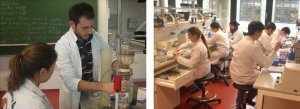Biochemie
| Degree: | Master of Science |
| Application: | mandatory |
| Start of programme: | winter semester only |
| Standard course duration: | 4 |
| Focus options: | 100% |
| Language requirements: | German, English (on application) |
| Language of instruction: | German, English |
Faculty of Biosciences and Faculty of Chemistry and Earth Sciences
Note!
Admission to the degree programme is restricted to 25 places per academic year.
For detailed information on the course and on the current application period, please consult the website of the Faculty of Biosciences.
Course outline
Biochemistry investigates and describes the molecular structures and chemical processes occurring in living organisms at all levels of organisation. This endeavour is predicated on the perspectives, insights and methods of organic, inorganic and physical chemistry and of molecular biology.
Among the central concerns of biochemistry are the structure, biosynthesis and function of proteins and nucleic acids; the metabolism and its regulation; the mechanisms of enzymatic catalysis; the structure and functioning of molecular machines for cell transport and motion; the structure, features and function of membranes; and the mechanisms involved in cellular energy conversion and biological signalling processes.
Given its range of interests, biochemistry has a crucial impact on the foundational research performed in many areas of the biosciences (including their applied disciplines) and is increasingly operative in initiating basic research projects in chemistry.
This B.Sc. course is part of a research-oriented Bachelor/Master programme. At Bachelor’s level, students are provided with the scientific and methodological essentials qualifying them for initial entry into a biochemical profession and laying the foundations for independent further education and career choices.
An essential function of the Bachelor’s course is to prepare students for the consecutive M.Sc. course in biochemistry or the acquisition of further qualifications in neighbouring disciplines. To this end, students are first of all given a broad grounding in the relevant sectors of chemistry and acquire the knowledge of mathematics and physics that is indispensable for the study of biochemistry. Once these foundations have been laid, students then acquire wide-ranging theoretical knowledge, methodological orientation and practical skills in the various sectors of biochemistry. These items are supplemented by an introduction to topical issues in biochemical research. A major concern of the course is to acquaint students at an early stage with the practical aspects of biochemical laboratory work and to impart to them the knowledge and skills required to autonomously work in a research team.
Course structure
The Master’s course in Biochemistry is designed as a four-semester, interdisciplinary degree programme leading to the conferment of a Master of Science (M.Sc.) degree. The curriculum is organised into modules consisting of classes (lectures, seminars, practical classes, lab practicals) in which the subject matter in question is dealt with cogently and coherently within a predefined space of time. There are examinations at the end of each class. Modules to be completed during the course of study are completed in the first three semesters. The Master’s thesis is written in the fourth semester.
Credits (CP) are awarded for successful completion of the modules. These CP must add up to 120 by the end of the course.
The Master’s course in Biochemistry consists of compulsory and compulsory elective modules.
The compulsory module, Biochemistry, conveys further knowledge about the theory and practice of biochemical research. In the compulsory interdisciplinary module, Focus in Biochemistry, students gain an insight into current research being carried out at selected Heidelberg institutes of chemistry and biology. This enables students to select a research focus for the Master’s thesis. Completion of two research placements, each lasting nine weeks, is also a compulsory part of the degree programme.
In addition to the compulsory modules; Biochemistry, and Focus in Biochemistry; and the two compulsory research placements, a total of three compulsory elective modules must be chosen from the interdisciplinary chemistry and biology modules on offer. Students must therefore select either chemistry or biology as their specialist field.
The modular structure of the course is also designed to enhance student mobility. Students who want to spend a semester abroad are recommended to do so in the third or fourth academic semester. Following consultation with the dean of studies for the biochemistry study unit, courses in these semesters, including the Master’s thesis, may be completed abroad.
Model curriculum
The academic programme consists of compulsory and compulsory elective modules. The compulsory biochemistry modules (blue) are mandatory. In addition, a total of three compulsory elective modules (grey) are selected. These are chosen freely and can be taken in any combination, according to the student’s individual interests.
A detailed description of the structure of the academic programme, and of the individual courses can be found in the module handbook.
![[BioSC] Master Biochemie Modellstudienplan](http://www.uni-heidelberg.de/md/bio/studium/studiengang/biochemie/master_biochemistry.jpg)
Formal requirements
Admission
You may apply for the Master’s course in Biochemistry, provided that you:
- are able to prove successful graduation from a Bachelor’s degree programme in the subject area biochemistry, OR graduation from a scientific degree programme which included biochemistry as a minor subject. (If the degree certificate is not available at the time of application, this must be supplied at a later date to ensure final admission.)
- are able to prove sufficient English and German language proficiency (for details please see the selection regulations )
University places are allocated in a two-part selection procedure. The selection commission for the Master’s course in Biochemistry shall pre-select candidates for invitation to interview. Pre-selection will be based on the following:
- any examination results gained in a completed Bachelor’s degree course, which are of specific relevance to the Master’s course in Biochemistry
- additional qualifications which may indicate applicants’ suitability and motivation
The highest ranking applicants will be invited to interview. The dates for interviews will be provided promptly in due course.
Please note: Interviews are held on only one day. No exceptions are made, and no alternative dates can be arranged. Invitations to interview shall be sent per email. It is therefore essential that you provide a correct email address on your application!
In the final ranking for admission to the degree programme, the results from pre-selection and the interviews shall be equally weighted. Details about the selection procedure for the Master’s course in Biochemistry are set out in the selection regulations , where they can be accessed.
Interested parties holding a university entrance qualification may apply directly to Heidelberg University to participate in the selection procedure. The application must be submitted to the University by 15 March for the winter semester of the current academic year (cut-off period is determined by receipt stamp of the University, not by the postmark). The application is to be submitted online and by post to the University’s student administration office. Information about applications and the mandatory online application form shall be provided on the website of the student administration office closer to the time of application. Please note: The application sent by post must contain copies of the following:
- Copies of any held higher education degree certificates
- A transcript for all credits gained to date. The Bachelor’s degree certificate must be provided at a later date for final admission.
- A letter of motivation (max. 1 side of A4)
- A curriculum vitae
- Proof of German as well as English language proficiency (see selection regulations)
- A declaration of whether entitlement to take the final exams in a Bachelor’s course in Biochemistry has been lost
Please note: To ensure smooth processing of your application, we recommend that you submit your online application, and send your application by post, along with all necessary documents, as early as possible, to the student administration office at Heidelberg University. “Auswahlverfahren Biochemie” (Biochemistry Selection Procedure) is to be written on the envelope. This enables quick processing.
International applicants
Special regulations apply for international study applicants. For more information please consult Heidelberg University’s International Relations Office ( Dezernat Internationale Beziehungen , Seminarstraße 2).
Study and examination regulations
Study and examination regulations for the Master’s programme
Examinations board
Issues arising in connection with examinations, credit transfer and academic credential recognition are dealt with by the relevant examinations board/office. For more information, consult the academic advisor(s) indicated below.
Fees
Tuition fees at Heidelberg University must be paid at the beginning of each semester.
Academic advisor
Dr Rainer Beck
Heidelberg University Biochemistry Center
Im Neuenheimer Feld 328
D-69120 Heidelberg
Phone:+49(0)6221-54-5452
Email: rainer.beck@bzh.uni-heidelberg.de
Contact
Faculty of Biosciences
Internet: http://www.bio.uni-heidelberg.de/fakultaetbio/en/main
Faculty of Chemistry and Earth Sciences
Internet: http://www.chemgeo.uni-hd.de/
Address of both Faculties
Im Neuenheimer Feld 234
D-69120 Heidelberg


